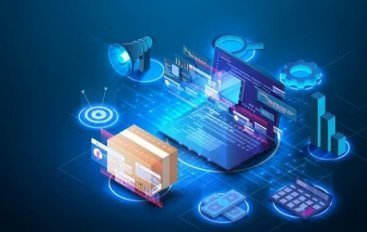AI in Supply Chain Management: Revolutionizing Efficiency and Resilience
Discover how AI is transforming Supply Chain Management, enhancing efficiency and resilience. Explore cutting-edge solutions and stay ahead of the competition.

AI in Supply Chain Management: Revolutionizing Efficiency and Resilience
Artificial Intelligence (AI) is a leading-edge technology that is revolutionised modern industries ranging from medicine to manufacturing and supply chain management. The global economy is more complex than ever, and businesses need to streamline their supply chains while reducing costs and building resilience. In this article, we will take a closer look at the transformative role of AI in the field of supply chain management. We will explore some of its key applications, what benefits AI provides for supply chains, and how partnering with an AI software development company can boost efficiency and overall performance.
The Importance of Efficient Supply Chain Management
Effective supply chain management is crucial to satisfying customers, keeping up with the competition, and minimising operating expenses. Supply chains are also complicated due to demand variability, disruptions in supply and inefficiencies in the logistics process. However, AI offers innovative capabilities to overcome such challenges. AI-driven solutions provide real-time insights, predictive analytics and automation capabilities.
AI Applications in Supply Chain Management
AI’s polyvalence makes it applicable to a wide range of supply chain management applications, from demand planning to logistics optimisation. The following are some key AI applications in supply chain management:
1. Demand Forecasting
It’s vital to have accurate demand forecasts in the business because it enables good inventory management and effective production plans. Machine Learning and artificial intelligence algorithms allow for consumption pattern identification from historical data, future prediction, and even anticipation of demand changes. This is done by scraping the web for all the available information on markets, cultures, economics, prices, social media, and more – providing companies with valuable insight to stay ahead of the competition.
2. Inventory Management
AI-enabled inventory management systems use real-time data to track inventory, monitor stock movements, and automate replenishment operations. By detecting and responding to patterns in demand, machine-learning algorithms can help minimise stock shortages and usher in a more precise and stable business environment.
3. Supplier Relationship Management
Through the use of AI, supplier relationship management is enhanced by allowing corporations to better understand suppliers on their own terms. It can shed light on how suppliers are performing, what risk factors are affecting them and how they are likely to be affected by market conditions. With AI algorithms, the reliability of suppliers can be assessed and the risk of possible disruption can be anticipated and prevented at an early stage. AI can find alternative suppliers for businesses and help them mitigate risks if supply chain resilience is compromised in the market at large.
4. Logistics and Transportation Optimization
AI can be used to optimise logistics and transport flows by helping with decisions ranging from where to deliver items next to how to avoid delays. For this, AI draws on data from polestars and weather forecasts, but also from traffic sensors that can give real-time information on possible congestion. For example, route optimisation tools powered by AI can advise where to deliver next or via which route – thereby reducing distance and saving two vital resources: time and money. AI can even forecast delays and recommend remedies in advance.
5. Predictive Maintenance
These AI-powered predictive maintenance systems in manufacturing monitor the health of equipment and detect impending failures before they even happen. By analysing sensor data and historical maintenance records, machine-learning algorithms can establish patterns that indicate the degradation of an equipment part, known as the first sign of fatigue or imminent failure, thereby enabling businesses to schedule routine maintenance at the most advantageous time to avert costly downtime.
Benefits of AI in Supply Chain Management

Integrating AI in our supply chains can bring about several benefits that improve operations, cost efficiencies and resilience. Here are some of the key benefits:
1. Improved Accuracy and Efficiency
Because AI can analyse far more complex datasets and identify new patterns, demand forecasts are more accurate, inventories are more tightly managed, and logistics are more optimised – all of which contributes to greater operational efficiency and ultimately lower costs.
2. Enhanced Decision-Making
AI gives supply chains virtually instantaneous insights and predictive analytics that help focused decision-making. If demand changes, if there are supply bottlenecks, or changes in markets, they’ll react and respond to it in real time.
3. Increased Resilience
Using AI to identify these risks in the relevant supply chains, to anticipate disruptions, and to guide in proactive mitigation of problems, a business can maintain operational continuity even during the unexpected and unknown.
4. Cost Savings
Better inventory management, fewer transport costs, lower equipment failures: even small improvements can yield substantial administrative savings, which create supplemental or excess working capital that can be reinvested in other areas.
5. Enhanced Customer Satisfaction
Good supply chain management means that products are delivered to customers on time, which boosts the company's reputation by giving them the satisfaction they're looking for. AI-controlled systems help these firms meet their customer demands.
The Role of AI Software Development Companies
Working with AI software development companies is a great way to maximise the potential of AI in the supply chain. These companies have strong expertise and resources in developing customised AI solutions for their clients’ needs. Here we list the main reasons that make it beneficial to work with an AI software development company.
1. Expertise and Experience
An AI software development company's personnel consists of well-trained AI or Machine Learning professionals who are up-to-date with the latest developments in the field, which in turn, enables them to bring out innovations and curate intelligent AI solutions.
2. Customized Solutions
In terms of the supply chain, every business is different and off-the-shelf AI solutions will not always fit. This is why the best AI software development companies are building custom solutions at the intersection where a business ‘B’ meets their exact business goals and requirements.
3. Scalability
According to experts, AI solutions must be scalable to manage escalating data volumes and emerging individual business requirements. AI software developers’ production architectures efficiently scale computing to manage growing workloads without affecting performance.
4. Integration Capabilities
The incorporation of AI solutions within existing systems requires a great deal of skill, experience and deep expertise in software development. AI software development companies can provide the technical know-how to smoothly integrate AI tools into your business’s existing infrastructure.
How to Hire an App Developer for AI Projects
With AI increasingly used across the supply chain stack, the demand for AI specialist app developers is rising, so here is how to hire app developer for AI projects.
1. Define Your Project Requirements
Before you start searching for an app developer, you should then have some project requirements defined: what is the problem you are trying to solve, what features should it have, etc. So what you are trying to do is somehow define your project requirements upfront so you know whom to go to.
2. Look for Relevant Experience
When considering potential developers, you need to verify that the candidate has experience developing AI and Machine Learning projects. Ask them to share their portfolio or case studies and examples of AI-based applications that they have created.
3. Assess Technical Skills
AI projects require proficiency with a mix of programming languages such as Python, R and Java, as well as expertise with ‘machine learning’ frameworks and libraries such as TensorFlow and PyTorch. Get clear on the technical skills the developer needs, in order to carry out your project.
4. Evaluate Problem-Solving Abilities
Some AI roles present particularly complex problems, and you should be especially on the lookout for developers with demonstrable analytical and problem-solving skills. Have them undergo technical interviews or assessments.
5. Communication and Collaboration
Also, an AI project needs good communication and collaboration, so look for a developer who can express ideas clearly, coordinating and collaborating effectively with the rest of the team.
Future Trends in AI for Supply Chain Management
Supply-chain management is in for some interesting twists and turns as AI technology progresses, beginning with the following trends. 1. AI systems will become increasingly sophisticated The upcoming developments to build ’smart’ systems – those that can sense, learn, and reason in the background – will widen the range of options available. How far away are we from these superior AI systems? Stay tuned. 2. Data mining is getting better The best analytics available today come from data mining. This involves using a vast array of historical data points to mathematically predict seldom-occurring events, such as the onset of seasonal demand for back-to-school apparel or the end of summer deals for school-supplies. As continuous data-mining becomes a reality, predicting rare events will become a table-stakes game. Algorithms will mine near-real-time purchasing trends, as well as fair-weather and dry-spells data, and the impact of tsunamis and atolls on water flows. The list is endless. Thanks to these advances, companies will soon possess detailed forecasts of the world’s hidden phenomena, including events that have yet to occur. 3. Algorithms in operations Researchers, such as those from the Lumen and Wharton schools, are creating algorithms for reality and adapting them for use in the real world, where everything is messy, i.e. ‘non-linear’ in mathematical terms.
1. Autonomous Supply Chains
Further ahead in the future are autonomous supply chains. This is another technology-based trend for supply chain management. Autonomous supply chains use AI, robotics and IoT (internet of things) to automate end-to-end processes, from the point of purchase to the point of delivery, with minimal or no human intervention, no errors, and more efficiency.
2. Blockchain Integration
By combining these two technologies to create AI-enabled, or ‘smart’, blockchains, supply chains can benefit from both the transparency and security conferred by blockchain, while AI translates this data into actionable information through pattern recognition and predictions on how to optimise operations.
3. Sustainable Supply Chains
AI technology already plays an important part in sustainable supply chains – by optimising utilisation of all resources, minimising waste and carbon footprint, and so on. More and more business decisions revolve around the issue of sustainability – be it energy provision, food production, industrial processing, or anything else – and these have to be made in an economically viable and efficient manner. Once again, with smart algorithms, this can be achieved.
4. AI-Driven Supply Chain Finance
Through data analysis of transaction, decision-making accuracy is upgraded by leveraging on AI tools to enable better financing of businesses and improve cash flow management with lower financing costs.
Conclusion
One example is how AI makes supply chain management more effective. It helps reduce costs, improve efficiency, and increase resilience through applications in areas like demand forecasting and inventory management, logistics, transportation, and predictive maintenance. By partnering with an AI software development company, you can leverage the technology powerfully and tailor it to suit your particular needs.
It is essential to keep abreast of latest AI advancements and best practices to utilise AI to its fullest, as the AI evolution continues. On an upper note, if you are planning to hire an app developer for your AI project or just want to explore latest AI applications, this overview on AI basics and its transforming potential to completely alter the way organisations conduct their business is the perfect place to start. No matter where you are in your AI journey, be it a novice or an expert. Change is the only constant, they say. Now is the best time to embark on the journey, and create a future that is highly reliable with AI in supply chain management.
What's Your Reaction?
































